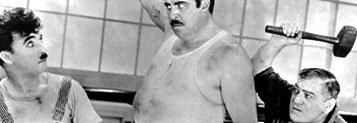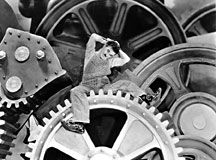The Film

Modern Times was the last
silent film Chaplin made and it was considered as his timeless
comedy masterpiece. The film's opening title - "The story
of industry, of individual enterprise - humanity crusading in
the pursuit of happiness" - is followed by a juxtaposition
of shots of sheep being herded and of workers going to work.
Chaplin's character is first seen as a worker being driven crazy
by his monotonous work on a conveyor belt to tighten the bolts
and being used as a human subject to test a machine to feed
workers when they work. The worker was fed up with the job and
his cruel boss keeps an eye on all his employees via a big TV
monitor. The worker's behavior becomes abnormal because of the
inhuman work. He eventually becomes trapped in the huge machine
itself, stuck in the gears. He comes out a little crazed, tightening
everything resembling bolts. He loses his job and is sent to
hospital. 
Nevertheless, he is arrested accidentally for leading a communist
parade. In fact he is just trying to return the red flag to
the man who dropped it. After a dramatic incident happens in
the prison, he is released and meets a girl. The two are dreaming
of a nice suburban life... Since then, he tries to find job
and want to make life better, but the cops are never far behind
the couple. In the end, it is a hopeful ending, and the couple,
arm in arm, set off down together a country road, towards the
horizon.
For more detail film information, please click
here.
First of all, we'd better know some background when the film
was being made. Robinson described in his notes on Modern Times:
Before the film was made, Chaplin has already preoccupied with the social and economic problems of this new age. In 1931 and 1932 he had left Hollywood behind, to embark on an 18- month world tour. In Europe, he had been disturbed to see the rise of nationalism and the social effects of the Depression, of unemployment and of automation. He read books on economic theory; and devised his own Economic Solution, is an intelligent exercise in utopian idealism, based on a more equitable distribution not just of wealth but of work. In 1931 he told a newspaper interviewer, "Unemployment is the vital question... Machinery should benefit mankind. It should not spell tragedy and throw it out of work." (1)
As a result, in the film Modern Times, Chaplin transforms his
observations and anxieties into comedy. Chaplin was inspired
by the assembly line of the automobile plants at that time,
so the movie begins with the worker working on an assembly line
for a steel corporation. His job is fastening bolts all day
as they come down a conveyor belt. Chaplin humorously demonstrates
the monotony of the routine of capitalism mass production and
the inhuman treatment from the boss. Because of this point,
his film became controversial and has several versions of interpretations.
Siliang Xu yu274663@yorku.ca

|
Disclaimer © 2003 - 2004 by class of SOSC 4319 at York University |